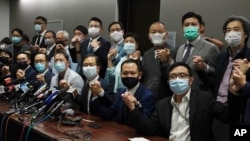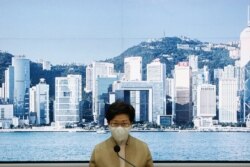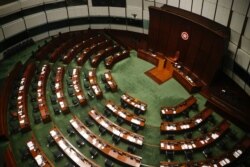From a distance, it might seem Hong Kong’s turmoil and chaos have lessened as the National Security Law and the global pandemic put a lid on mass pro-democracy protests that rocked the city last year. In reality, since coming into effect, the security law has been a catalyst for sweeping internal changes within the semi-autonomous city.
In the most recent case, four legislators, Alvin Yeung, Kwok Ka-ki, Dennis Kwok and Kenneth Leung, were removed Wednesday and lost their seats within Hong Kong’s top legislature. In August, they were part of a group of 12 pro-democracy election hopefuls who were all disqualified from running in the Legislative Council elections, initially due to take place in September.
All candidates were disqualified because of their failure to uphold Hong Kong’s Basic Law, according to the government.
Because the pandemic forced postponement of the elections for a year, however, the four lawmakers in question had been able to keep their seats—until now.
But Hong Kong Chief Executive Carrie Lam had long searched for a way to remove them. Lam openly sought guidance from China’s Standing Committee of National People’s Congress (NPCSC) for a resolution.
The NPCSC then passed the new resolution saying that lawmakers should be disqualified if they to fail to acknowledge China’s sovereignty, or if they are in support of Hong Kong independence, ask for foreign influence within the city, or do anything deemed to be a national security threat.
Hong Kong’s government now has the power to directly remove legislators without having to go through the courts. And that’s what happened Wednesday as the four lawmakers were then immediately removed.
The decision prompted the remaining 15 pro-democracy lawmakers to resign in solidarity, out of 19 in total. Once made official, as expected Thursday, there will be no pro-democracy opposition to challenge majority pro-Beijing members within the Legislative Council (LegCo).
The developments underscore Beijing’s ability and determination to dictate how Hong Kong is governed since the National Security Law came into effect back in June.
Now, for any incoming lawmakers who wish to be seated at LegCo, they first must uphold Hong Kong’s Basic Law and swear allegiance to the Hong Kong SAR. Lam herself even admitted this is so it “fulfills the political institution dominantly comprised of patriots.”
Since the protests last year, observers note a growing separation of identity within Hong Kong. More residents identify themselves as “Hongkongers” rather than Chinese. The trend comes despite Beijing pushing for more patriotic measures to be implemented in Hong Kong, including in education, and encouraging residents to be more aware of their national identity.
In the absence of an opposition presence within LegCo, the legislative agenda of pro-Beijing legislators remains to be seen on local Hong Kong issues such as redevelopment and voting rights.
What appears to be off the table, for now, are any by-elections—used to fill a political office that has become vacant. Lam herself reportedly ruled this out as happening during the interim council. With the pandemic continuing, it’s very likely there won’t be a fully seated LegCo until later in 2021.
As protests petered out after the arrests of thousands who are under investigation, lawmakers already were fighting an uphill battle. And with no legal opposition currently within LegCo, Hong Kong’s pro-democracy movement is widely seen has having entered an extremely vulnerable stage.






